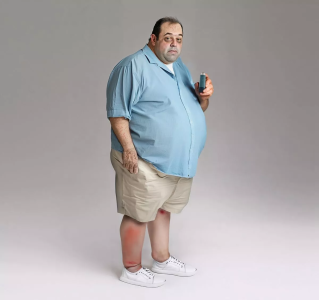Shocking AI predictions show how men's appearances could drastically change in 30 years from junk food
- Replies 7
In a world where convenience often trumps quality, the rise of ultra-processed foods has become a significant concern for health professionals and nutritionists alike. The potential impact of these dietary choices on our health is alarming, and recent AI-generated images have brought these concerns into stark visual reality. These images, which depict the potential future state of men's health and appearance if current dietary trends continue, are a sobering reminder of the importance of healthy eating habits.
The AI-generated image of 'Michael' is not a character from a dystopian novel but a representation of the average man in 30 years, assuming a continued diet heavy in ultra-processed foods. The visual is disturbing: Michael's posture is slumped, burdened by the weight of a distended belly and enlarged chest. His skin is marred by acne, his legs are swollen with sores, and his eyes are yellowed and surrounded by dark circles. This haunting figure is a stark warning of the potential consequences of a junk-food-laden diet.

The health implications of such a diet are far-reaching. Michael's physical appearance hints at underlying health issues, including asthma, depression, anxiety, and sleep disturbances, all of which are exacerbated by obesity. The risk of developing type 2 diabetes and heart disease is also significantly increased, making Michael a prime candidate for a heart attack or debilitating stroke.
The creation of this AI model was part of a report by recipe box service Gousto, aiming to raise awareness about the long-term impacts of today's eating habits and highlight the prevalence of unhealthy eating in the UK. The report comes at a time when ultra-processed foods, which are highly manufactured and laden with additives, have become a staple in the modern diet. These foods, including fizzy drinks, biscuits, and ready meals, have been linked to a range of health harms, including cancer.
The statistics are concerning: ultra-processed foods account for 57 percent of the average adult's diet and an even more alarming 66 percent of a child's diet in the UK. The country also tops the list for UPF consumption in Europe. With obesity rates soaring, a quarter of UK adults are now classified as obese, with some areas seeing rates close to half the local population.
The Nova system, developed by Brazilian scientists, categorizes foods based on their processing level. Unprocessed foods include fruits, vegetables, nuts, eggs, and meat, while processed culinary ingredients, such as oils, butter, sugar, and salt, are not typically consumed alone. The high consumption of ultra-processed foods is particularly concerning for children, with 15 percent of two-to-15-year-olds classified as obese.
Despite the desire to eat healthily, a poll by Gousto found that almost two-thirds of Brits are unaware of the long-term impacts of UPFs, with many citing time or financial constraints as barriers to healthier eating. Dr. Hilary Jones, a GP and media commentator, emphasizes that while ultra-processed foods are not inherently harmful, they become problematic when they dominate our diets at the expense of fresh, nutrient-rich foods. He advocates for cooking from scratch as a means to minimize UPF intake and maintain a balanced diet.
The link between ultra-processed foods and an increase in cancers, particularly in individuals under 50, is a growing concern among British experts. Professor Charles Swanton of Cancer Research UK has pointed to studies suggesting that certain gut bacteria, prevalent in those with low-fiber, high-sugar diets, may initiate mutations that reduce the body's ability to combat pre-cancerous cells.
Matthew Lambert, a nutritionist at the World Cancer Research Fund (WCRF), advises reducing consumption of processed foods high in saturated fat, sugar, and salt. These foods, which include cakes, biscuits, pastries, crisps, sugary drinks, and fast food, lack fiber and essential nutrients and should be consumed only occasionally and in small amounts.
The AI-generated image of Michael serves as a powerful visual aid to the potential consequences of a diet dominated by ultra-processed foods. It's a call to action for individuals and communities to reassess their eating habits and prioritize health and nutrition. As we age, the choices we make today can have a profound impact on our future health and appearance. It's never too late to make positive changes, and for our readers over 60, the importance of a balanced diet rich in whole foods cannot be overstated.
 We at the Seniors Discount Club encourage our members to share their thoughts and experiences with diet and health. Have you made changes to your diet that have positively impacted your well-being? Do you have tips for others looking to reduce their intake of ultra-processed foods? Join the conversation in the comments below and let's support each other in making healthier choices for a brighter future.
We at the Seniors Discount Club encourage our members to share their thoughts and experiences with diet and health. Have you made changes to your diet that have positively impacted your well-being? Do you have tips for others looking to reduce their intake of ultra-processed foods? Join the conversation in the comments below and let's support each other in making healthier choices for a brighter future.
The AI-generated image of 'Michael' is not a character from a dystopian novel but a representation of the average man in 30 years, assuming a continued diet heavy in ultra-processed foods. The visual is disturbing: Michael's posture is slumped, burdened by the weight of a distended belly and enlarged chest. His skin is marred by acne, his legs are swollen with sores, and his eyes are yellowed and surrounded by dark circles. This haunting figure is a stark warning of the potential consequences of a junk-food-laden diet.

An AI-generated image shows the future health decline of the average British man from a diet rich in ultra-processed foods. Credit: Jam Press / Gousto
The health implications of such a diet are far-reaching. Michael's physical appearance hints at underlying health issues, including asthma, depression, anxiety, and sleep disturbances, all of which are exacerbated by obesity. The risk of developing type 2 diabetes and heart disease is also significantly increased, making Michael a prime candidate for a heart attack or debilitating stroke.
The creation of this AI model was part of a report by recipe box service Gousto, aiming to raise awareness about the long-term impacts of today's eating habits and highlight the prevalence of unhealthy eating in the UK. The report comes at a time when ultra-processed foods, which are highly manufactured and laden with additives, have become a staple in the modern diet. These foods, including fizzy drinks, biscuits, and ready meals, have been linked to a range of health harms, including cancer.
The statistics are concerning: ultra-processed foods account for 57 percent of the average adult's diet and an even more alarming 66 percent of a child's diet in the UK. The country also tops the list for UPF consumption in Europe. With obesity rates soaring, a quarter of UK adults are now classified as obese, with some areas seeing rates close to half the local population.
The Nova system, developed by Brazilian scientists, categorizes foods based on their processing level. Unprocessed foods include fruits, vegetables, nuts, eggs, and meat, while processed culinary ingredients, such as oils, butter, sugar, and salt, are not typically consumed alone. The high consumption of ultra-processed foods is particularly concerning for children, with 15 percent of two-to-15-year-olds classified as obese.
Despite the desire to eat healthily, a poll by Gousto found that almost two-thirds of Brits are unaware of the long-term impacts of UPFs, with many citing time or financial constraints as barriers to healthier eating. Dr. Hilary Jones, a GP and media commentator, emphasizes that while ultra-processed foods are not inherently harmful, they become problematic when they dominate our diets at the expense of fresh, nutrient-rich foods. He advocates for cooking from scratch as a means to minimize UPF intake and maintain a balanced diet.
The link between ultra-processed foods and an increase in cancers, particularly in individuals under 50, is a growing concern among British experts. Professor Charles Swanton of Cancer Research UK has pointed to studies suggesting that certain gut bacteria, prevalent in those with low-fiber, high-sugar diets, may initiate mutations that reduce the body's ability to combat pre-cancerous cells.
Matthew Lambert, a nutritionist at the World Cancer Research Fund (WCRF), advises reducing consumption of processed foods high in saturated fat, sugar, and salt. These foods, which include cakes, biscuits, pastries, crisps, sugary drinks, and fast food, lack fiber and essential nutrients and should be consumed only occasionally and in small amounts.
The AI-generated image of Michael serves as a powerful visual aid to the potential consequences of a diet dominated by ultra-processed foods. It's a call to action for individuals and communities to reassess their eating habits and prioritize health and nutrition. As we age, the choices we make today can have a profound impact on our future health and appearance. It's never too late to make positive changes, and for our readers over 60, the importance of a balanced diet rich in whole foods cannot be overstated.
Key Takeaways
- An AI-generated image depicts the future health decline of the average British man due to a diet heavy in ultra-processed foods.
- The image showcases severe obesity-related health issues such as asthma, depression, anxiety, type 2 diabetes, and heart disease, along with poor skin and joint conditions.
- Evidence links high consumption of ultra-processed foods to a variety of health problems, including cancer, and these foods make up over half of the average UK adult's diet.
- Health experts and studies call for eating less processed food, promoting diets rich in fresh, nutrient-dense ingredients to prevent chronic health conditions and support overall well-being.








